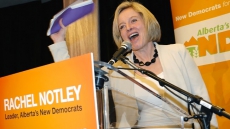OTTAWA — The effects of the enormous Alberta wildfire on the ever-crucial oil sector have prompted forecasters to trim their 2016 economic growth predictions for the entire country.
Experts, including those from several big banks, have shaved their outlooks in recent days following the huge blaze that tore through Fort McMurray — the heart of oil country.
The emergency forced nearby oilsands facilities to shut down last week, but some have begun to restart their operations. More are expected to get back to work over the coming days.
But even temporary closures in the economically important industry are expected to have an impact on the nationwide real gross domestic product.
In many cases, the updated real GDP projections also reflect disappointing economic data releases in recent weeks for trade and the labour force.

Since the fire, TD knocked its 2016 real GDP projection down to 1.6 per cent from 1.9 per cent — 0.2 percentage points of which it attributed to the wildfire.
BMO clipped its prediction to 1.6 per cent from 1.8 per cent — evenly dividing the blame for the drop between the poor economic numbers and the disaster.
CIBC lowered its outlook from 1.6 per cent to 1.5 due entirely to the fire.
At this early stage, however, economists stressed that their predictions remain in flux as officials and companies gain a better understanding of the situation.
"Anyone who is doing this today is still making some big guesses about how the oil facilities and the rest of the town are going to come back," CIBC chief economist Avery Shenfeld said.

Forecasters expect the wildfire to contribute to flat growth or even a contraction in the second quarter of the year. They now expect the economy to rebound with stronger growth in the third quarter.
BMO chief economist Doug Porter said losing activity early in a given year, even if it's regained later on, usually means the economy will still suffer a slight loss for the year as a whole.
The wildfire, which has spread across about 2,300 square kilometres and continues to burn, destroyed about 10 per cent of Fort McMurray's 25,000 buildings. More than 80,000 people were evacuated from the northern Alberta community.
"Thank goodness most of the city was spared — the vast majority of it — and fortunately most of the (oilsands) facilities were, at the end of the day, unaffected," Porter said.
"It certainly could have been much worse."
Still, the disaster and the production shutdowns were severe enough to compound ongoing troubles in a province that has been Canada's economic engine for years.

Before the fire, the provincial and federal treasuries were already under intense fiscal pressure from still-low oil prices that started to plummet nearly two years ago.
Both governments are expected to allocate large sums to cover the costs of things like firefighting and reconstruction.
For example, Ottawa spent more than $1.3 billion to respond to the massive 2013 floods in southern Alberta and southeastern British Columbia, according to a February report by the parliamentary budget officer.
Porter said the federal government should have more than enough cushion with its much-debated, $6-billion annual risk adjustment that it included in its March budget.
The government has said it included the contingency padding, which was much-larger than usual, in case the country's economic performance turns out to be weaker than experts have predicted.
Critics have said the Liberals made the adjustment bigger than necessary to allow them to reap the political benefits of beating expectations.
But even with the unexpected wildfire costs, Porter still expects the Ottawa's 2016-17 shortfall to be smaller than the projection of nearly $30 billion outlined in the budget.

"I would say it's early days yet to talk about the fiscal implications, although I suspect the federal government will contribute heavily," Porter said.
"I don't dare put a figure on it at this point."



